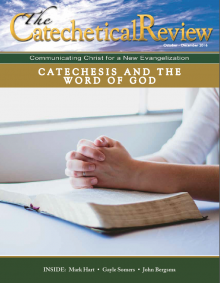 The Word of God teaches us, clearly and beautifully, with what an eternal and infinite love our Lord Jesus Christ loves us. For us, he willingly endured the agony of the cross. When he rose again from the dead, he rose for us, taking us into his eternal embrace. We are united with him in the New Covenant. Washed in the blood and water that poured from his side on the cross, we remain his alone. This is the mystery of our holy Catholic faith, which has been handed on—vibrantly living, whole, unchanging—through all the generations since the first Easter. By our holy baptism, we become the children of this covenant of divine love. We receive the priceless gift of this faith, this transforming belief in the power of Christ’s victory over death and sin. It is the most basic content of the Word of God, graspable even by young children, that, because of God’s love, we are able to be healed by his wounds and to live in his death. And just as we have received this faith from our Mother, the Church, so also we pass it on to others, whole and intact – “Tradition” (in Latin) or “catechesis” (in Greek). All of us, because of baptism, are catechists. In a formal sense, this is especially true of parents, and of clergy. It is essential to these two vocations to catechize well and faithfully. We rely also on the many generous volunteers who staff our parish-based catechetical programs. All of us proclaim Christ through our daily actions—well or poorly, according to our own reception of the faith
The Word of God teaches us, clearly and beautifully, with what an eternal and infinite love our Lord Jesus Christ loves us. For us, he willingly endured the agony of the cross. When he rose again from the dead, he rose for us, taking us into his eternal embrace. We are united with him in the New Covenant. Washed in the blood and water that poured from his side on the cross, we remain his alone. This is the mystery of our holy Catholic faith, which has been handed on—vibrantly living, whole, unchanging—through all the generations since the first Easter. By our holy baptism, we become the children of this covenant of divine love. We receive the priceless gift of this faith, this transforming belief in the power of Christ’s victory over death and sin. It is the most basic content of the Word of God, graspable even by young children, that, because of God’s love, we are able to be healed by his wounds and to live in his death. And just as we have received this faith from our Mother, the Church, so also we pass it on to others, whole and intact – “Tradition” (in Latin) or “catechesis” (in Greek). All of us, because of baptism, are catechists. In a formal sense, this is especially true of parents, and of clergy. It is essential to these two vocations to catechize well and faithfully. We rely also on the many generous volunteers who staff our parish-based catechetical programs. All of us proclaim Christ through our daily actions—well or poorly, according to our own reception of the faith
We teach best what we love most
Actions speak louder than words. We teach others where our heart is, mostly by what we do. We influence others for good or ill, most profoundly by the example of what we do. How we pass on the faith starts with our actions: the daily choices we make about what is important to us, what is negotiable, and what doesn’t matter at all. As Blessed Paul VI insisted, people listen to the witness of saints and martyrs more than to the instruction of teachers; and if they listen to teachers, it is because they first offer a holy example.[i] Each of us, then, is called by the Word of God to hold firmly the precious gift of faith, so that we can give it to others. To pass on the faith well, we must show consistently that Jesus Christ and his teachings truly matter to us. This means that we cannot compromise our faith in him in order to get along. We cannot serve two masters[ii]; we cannot make our Lord Jesus Christ just another among our worldly priorities; and we can never deliberately commit evil, even if our intentions are good. However, catechesis exceeds example of living, for actions by themselves don’t proclaim their own truth. It is also necessary to teach with words the meaning of the acts of loving faith. “For Zion’s sake I will not be silent,” as the prophet Isaiah says.[iii] For this, we need not only to receive God’s saving love, and to live it, but also to develop some personal commitment to knowing the Word of God. We can attract others with loving witness, but we teach also with explicit meaning.[iv]
We teach only from within the Church
None of us, however, can live and teach this faith convincingly, or even at all, apart from our communion in the Church, because “My teaching is not mine, but his who sent me” (Jn 7:16). To live how Christ lived, and to teach what Christ taught, we must belong to him alone. But only the Church belongs to him alone, as his spotless Bride, and so we can only do so in the Church. This means that parents, clergy, and catechists who would hand on the faith must first receive it with humble submission, at the foot of the Cross. Having been fed, only then can we feed others in turn. Here again we must struggle consciously against a world that dismisses traditional ideas as useless. Our culture presumes that humanity is somehow in a new, unprecedented situation in the world. Working from an evolutionary and historicizing model, we imagine that we are somehow smarter and better than our ancestors, but this is not true. Human nature has not changed, nor have the moral realities, nor the four last things. Recognizing, therefore, our initial bias against Tradition, we need to work harder to overcome it, in order to accept more fully what the Church has always taught.
Families best hand on the faith
Most of the Church’s catechesis today consists of parish catechetical programs; but the most urgent task of catechesis is not that of parishes but of families. Parents should strive to live exemplary lives of holiness and prayer and to teach their children our holy Catholic faith in the light of Tradition. Parents are the first teachers of their children and the ones who most profoundly form their minds, hearts, and consciences. If the witness and teaching of parents is sound, children will be better prepared to become disciples. “Parents should regard as their proper mission the task of transmitting human life and educating those to whom it has been transmitted. They should realize that they are thereby cooperators with the love of God the Creator, and are, so to speak, the interpreters of that love.”[v] In our modern world, parents have many choices to make in fulfilling their responsibilities for their children. Catholic schools strive to make the moral and faith dimensions of education explicit in all the subjects taught. Public schools sometimes seem to reduce or ignore those dimensions, but offer a “free” education in functional truth (and sometimes in false ideologies). Home schooling offers great flexibility in curriculum and scheduling, and the best integration of education and family. All of these choices offer pros and cons, and parents must choose, within the moral teaching of the Church, what is best suited for their family’s particular circumstances. Nevertheless, parents always retain their primary responsibility to educate. Only part of this responsibility can be delegated. Parents cannot simply send their children off to school and expect that this fully acquits their responsibilities. Parents must talk to their children about what happens in school and know what their homework involves. Parents must take their children to Mass each week, and to Confession and Holy Hours. Families must pray together. Families must form their faith together, by the shared practice and study of it. From these faith-filled homes will come well-catechized young men and women who will lead the Church and shape the secular world, as well as accept with joy their vocations as ordained and consecrated, as husbands and wives, as parents and teachers.
Communion of Saints
Another point of catechetical urgency is to reclaim devotion to the saints. Friendship with the saints in heaven, like our best friendships in this world, can do so much to help us in our life of faith. The saints understand us, especially our struggles, difficulties, and imperfections, for they too struggled in this life. Yet they persevered, clinging to the Word of God and the sacraments. Now, in heaven, they desire nothing more than that we, their friends, might join them there. Their intercession is such a powerful means of assistance for us. Of course, Mary desires to help us the most! As our mother, she is always ready to respond tenderly to our needs, carrying us to the feet of her Son and teaching us to conform our hearts to his most Sacred Heart.
Deep and prayerful union with God
Finally, to be holy and effective catechists in our homes and parishes, we must above all be nourished with deep, contemplative prayer. Clergy are taught to pray contemplatively; parents and volunteer catechists need to be taught as well. This sort of prayer keeps the Word of God, and all the teachings of Christ and the Church, personal realities rather than mere ideas. Contemplative prayer leads us deeper into a personal encounter with God who loves us, and thus prepares us both to receive and to give the faith ever more deeply. Being consistently face-to-face with God in prayer is the root of our conviction, witness, fidelity to vocation, catechetical authority, and shared devotion. As Pope Benedict Emeritus exhorts us, “Some of you might perhaps describe your adolescence in the words with which Edith Stein...described her own: ‘I consciously and deliberately lost the habit of praying.’ During these days, you can once again have a moving experience of prayer as dialogue with God, the God who we know loves us and whom we in turn wish to love.... In the Church and through the Church you will meet Christ, who is waiting for you.... Dear young people, the happiness you are seeking, the happiness you have a right to enjoy has a name and a face: it is Jesus of Nazareth, hidden in the Eucharist. Only he gives the fullness of life to humanity! With Mary, say your own ‘yes’ to God, for he wishes to give himself to you.”[vi] Bishop Walker Nickless originally hails from Denver and was appointed Bishop of Sioux City, Iowa by Pope Benedict XVI in 2005. In 2009, Bishop Nickless penned his first pastoral letter Ecclesia Semper Reformanda (the Church is Always in Need of Renewal), which has formed the basis for evangelization in the Diocese of Sioux City and beyond.
Notes
This article orignally appeared on pages 12-14 of the printed edition.
This article is from The Catechetical Review (Online Edition ISSN 2379-6324) and may be copied for catechetical purposes only. It may not be reprinted in another published work without the permission of The Catechetical Review by contacting [email protected]

















